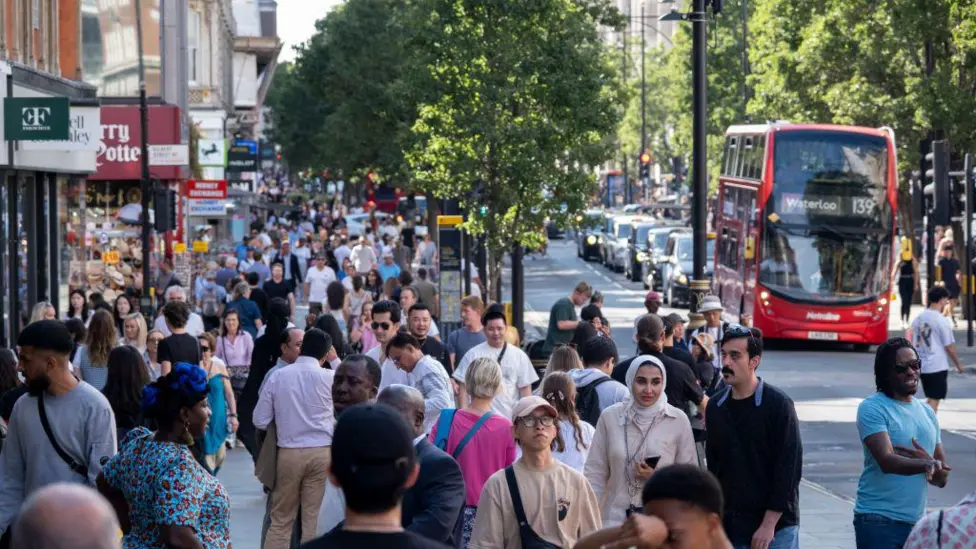Net migration to the UK drop sharply in 2024, falling by almost half compared to the previous year, according to new figures released by the Office for National Statistics (ONS).
The latest estimates show a net migration figure of 431,000 – the number of people who arrived in the UK minus those who left – in the 12 months to December 2024. That’s down from 860,000 in 2023, marking the largest numerical decrease on record.
Key Factors Behind the Sharp Decline
The ONS attributes the dramatic drop to several factors:
- Reduced work and study migration following policy changes introduced by the previous Conservative government.
- A significant decline in the number of dependants accompanying students and workers.
- Many individuals who arrived on study visas post-COVID-19 have now completed their courses and left the country.
The last time the UK experienced such a significant year-on-year fall in migration was during the early COVID-19 pandemic. At that time, net migration dropped from 184,000 in 2019 to 93,000 in 2020.
Impact of Government Policy
The ONS report highlights the impact of visa restrictions introduced by the outgoing Conservative government. One major policy target was reducing the number of international students bringing family members, a measure championed by former Home Secretary James Cleverly.
Additionally, the easing of global travel restrictions post-pandemic allowed many who had postponed plans to leave the UK to finally do so — particularly international students and temporary workers.
Hotel Use for Asylum Seekers Drops – But Still Higher Than Under Labour
Separate data from the Home Office shows a decline in the number of asylum seekers being housed in taxpayer-funded hotels. In March 2025, there were 32,345 asylum seekers in hotels, down from 38,079 in December 2024. However, this remains higher than the 29,585 recorded when Labour came to power in June 2024.
The figures also show:
- A 9% increase in hotel use since Labour’s election win.
- A record high of 58,636 hotel-housed asylum seekers under the Conservatives in June 2023.
The government claims the recent fall is due to faster processing of asylum claims, especially those arriving by small boats. More asylum seekers are now either granted refugee status (allowing them to work) or scheduled for removal.
Returns and Deportations Increasing
According to Home Office data, 29,867 individuals, including failed asylum seekers and foreign criminals, have been returned to their countries of origin since Labour took office.
Home Secretary Yvette Cooper said the figures reflect “a 300,000 drop in net migration since the election” and promised further reductions as outlined in the recent Immigration White Paper.
“We’re cracking down on illegal working, increasing returns, and reducing asylum hotel use,” Cooper said.
“We will go further by introducing new counter-terrorism-style powers to tackle people smuggling gangs.”
Political Reactions: Mixed Praise and Criticism
While Labour highlights its role in reducing migration figures, several senior Conservative leaders have also claimed credit:
- Shadow Home Secretary Chris Philp credited previous Tory decisions but warned the numbers must drop further.
- Tory leader Kemi Badenoch said the numbers are “still too high.”
- Reform UK leader Nigel Farage called the figures “still disastrous,” though “not as high as the great Tory betrayal.”
Expert Analysis: High Previous Numbers Made Decline Easier
The independent Migration Observatory at Oxford University described the drop as the result of “unusually high migration patterns” in 2023.
“With large numbers of care workers, students, and dependants arriving last year, it was easier for the government to cut numbers in 2024,” said Dr Madeleine Sumption, the unit’s director.
Dr Sumption noted that the decline would likely have minimal economic impact, as most of those leaving were not among the highest-paid or most economically essential migrants.
📌 Key Takeaways:
- Net migration fell from 860,000 in 2023 to 431,000 in 2024.
- Policy changes targeted international students and their dependants.
- Asylum hotel use dropped but remains above mid-2024 levels.
- Government increasing deportations and speeding up asylum processing.
- Labour and Conservatives both claim credit for migration drop.
- Experts say drop has limited economic consequences.



















